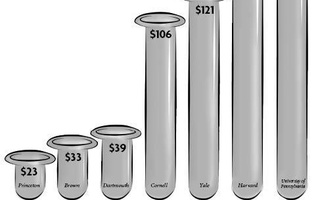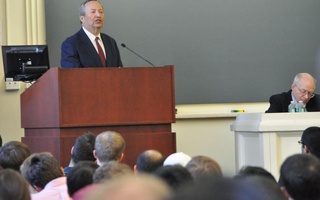Harvard researchers have received over $18 million in grant awards from federal government through the American Recovery and Reinvestment Act of 2009 (ARRA) as of the beginning of September. [SEE CORRECTION BELOW]
ARRA, or the stimulus bill, provided the National Institute of Health (NIH) with $10.4 billion to fund two-year research projects and Harvard has been granted funding for 65 research proposals, the majority of which deal with health care and medical research.
But Harvard’s total puts it far behind its biggest rival, Yale, which came out on top among national universities with approximately $40 million in grants for 115 projects.
According to Kevin Casey, the associate vice president for Government, Community and Public Affairs at Harvard, the Univeristy sent approximately 600 proposals to federal agencies participating in ARRA, including the NIH, the National Science Foundation, and the Department of Energy, among others.
One-hundred and twenty of those applications were for NIH Challenge grants, which provide 200 two-year research grants from an applicant pool of 25,000.
“[The stimulus] has unleashed a wave of innovative ideas,” Casey said. He added that he believes the stimulus will create jobs and fuel innovation.
Though he acknowledged that it may be too early to tell whether researchers will fare well in the ongoing application process and whether or not stimulus funds will negatively impact philanthropic donations.
The majority of grants will go towards research in biology and medicine, including $815,000 for AIDS research through the establishment of a Rhesus monkey colony.
Of Harvard’s 66 ARRA research grants, 45 are affiliated with Harvard Medical School.
Several research proposals focus on health care policy, including that of Ellen R. Meara, an associate professor of Health Care Policy at HMS.
Meara’s research, which investigates disparities between mental and physical health care for children, will receive a $453,601 grant from the National Institute on Drug Abuse.
Meara said that there are few restrictions imposed on researchers aided by stimulus funds, but that all individuals who participate in the program must fill out yearly reports with data about their employees and full time workers. All the information in these reports will be made publicly available online at a later date.
Though the turnover for receiving funds has been fairly rapid, according to Meara, Harvard researchers have only seen about $90,000 of the proposed grant sums.
According to Casey, they expect the funds to continue to flow in over the next few months.
—Staff writer Laura M. Fontanills can be reached at lfontan@fas.harvard.edu.
CORRECTION
The Sept. 8 news article "Stimulus Grants Boost Research" incorrectly stated that Harvard had received around $18 million in grant awards from the federal government through the American Recovery and Reinvestment Act of 2009. In fact, that figure only accounted for funds from the National Institutes of Health. The overall figure was approximately $40 million, similar to that received by Yale.
Read more in News
Prof Returns from WashingtonRecommended Articles
-
Smart StimulusThe government should look to break the grip of the recession and reject calls to curb necessary domestic spending.
-
 Stimulus Becomes a Life Line
Stimulus Becomes a Life Line -
Preventing the Next Jobs CrisisThe deck is currently stacked against decisive action to aid recovery. It’s time to stack it in favor.
-
 Summers Debates Fiscal Policies
Summers Debates Fiscal Policies -
 Krugman to Mankiw and Ferguson, Tsk! Tsk!
Krugman to Mankiw and Ferguson, Tsk! Tsk! -
That Hope Has Been TestedInstead of sheepishly staking his electoral bid on a shaky unemployment rate and praying that the ticking time bomb of the European sovereign debt crisis explodes sometime after November 6, Obama can and should explain the shortcomings of his term.













